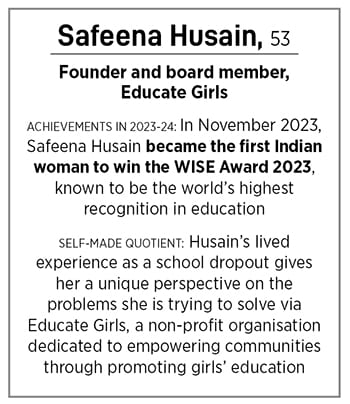How Safeena Husain has ensured over a million girls stay in school
After almost being forced to drop out of school, Safeena Husain became the first woman to win the prestigious WISE Award in 2023, for sending girls back to study


Safeena Husain spent a part of her childhood growing up in the slums of New Delhi. Due to difficult circumstances, she had to drop out of school for three years and was asked to get married instead. She was in her early teens.
However, an intervention by an aunt saved her and Husain was not only able to continue her education but also ended up going to the London School of Economics (LSE) to pursue higher studies.
Even at that point, she remembers people telling her father, “Beti hi toh hai, itna paisa kharch hota hai [You’ll end up spending so much money, she’s a girl, and eventually she’ll get married]."
“I didn’t want anyone to be in that position. I didn’t want girls or women to believe that they can’t do something in life because others around them have no aspirations for them or themselves," says Husain. “Going to LSE changed my perception about myself and how the world saw me. And I wanted every girl to have that opportunity."
Recognising the power of education, especially for girls, and where it got her, Husain founded Educate Girls in 2007, a non-profit organisation dedicated to empowering communities by promoting girls’ education.
 From being the first person—and woman—in her family to go to an overseas university, in November she also became the first Indian woman to win the World Innovation Summit for Education (WISE) Award 2023—a global recognition for any individual or a team for outstanding contribution to education. In 2012, Madhav Chavan won the $500,000 prize, known to be the highest recognition of its kind in the field of education in the world. He is the founder of Pratham, a non-governmental organisation working towards providing quality education to millions of underserved children in India.
From being the first person—and woman—in her family to go to an overseas university, in November she also became the first Indian woman to win the World Innovation Summit for Education (WISE) Award 2023—a global recognition for any individual or a team for outstanding contribution to education. In 2012, Madhav Chavan won the $500,000 prize, known to be the highest recognition of its kind in the field of education in the world. He is the founder of Pratham, a non-governmental organisation working towards providing quality education to millions of underserved children in India.
Working in partnership with the government, Husain’s Educate Girls currently operates in the villages of Rajasthan, Madhya Pradesh, Uttar Pradesh and Bihar. Volunteers help enrol and retain out-of-school girls, mobilising more than 1.4 million girls for enrolment to date in more than 24,000 villages.
Educate Girls follows a simple model. Volunteers go door to door, counsel the out-of-school girls’ families, enrol them in the closest government institution, and ensure they’re supported and are learning.
“The second aspect is to make it scalable, and that can happen if we tackle the mindset of people in these areas who still believe that a goat is an asset, but a girl is a liability," says Husain.
Click here for W-Power List 2024
For that to happen, it has to come from somebody from the villages, a voice they can trust and is reliable. So, the NGO devised a ‘Team Balika’ model to train a young change-maker from the village who is educated.
And she’s beginning to see changes from when she started. “Initially, if I went to a girl’s home, I had to talk to the family about why girls’ education is important. Today, I don’t need to have that conversation, people have become much more aware," she says. “Also, now, there is a whole generation of girls that has grown up with some level of education, so things are moving in a positive direction."
The biggest difference she has noticed is that men too have become allies.
Her lived experience gives her a unique perspective on the problems she’s trying to solve, says Ujwal Thakar, chairperson of the board at Educate Girls.
“Educate Girls is distinctively mission-aligned, taking a grassroots approach that reimagines sustainable change at scale. By keeping their ears to the ground through their large volunteer base, they ensure solutions are community-owned and can bring systemic, meaningful change," Thakar adds.
And this approach has ensured that things are moving in a positive direction faster than even Husain had anticipated.

Take these success stories, for instance. Nagina Bano, a woman they helped study, once told Husain that her education is the only thing that is truly hers. She said, “Nobody can steal it, nobody can burn it, nobody can beat it. It will be mine till my dying day." Husain adds, “I thought it was so profound. It truly is the one gift you’ve received, which is yours."
Another woman, Papita, is the sarpanch [village head] of her village and she’s allocating a majority of her budget towards girls’ education.
“The fact that girls are now dreaming is the biggest motivation for me to carry on with this mission," she says.
First Published: Mar 29, 2024, 12:24
Subscribe Now